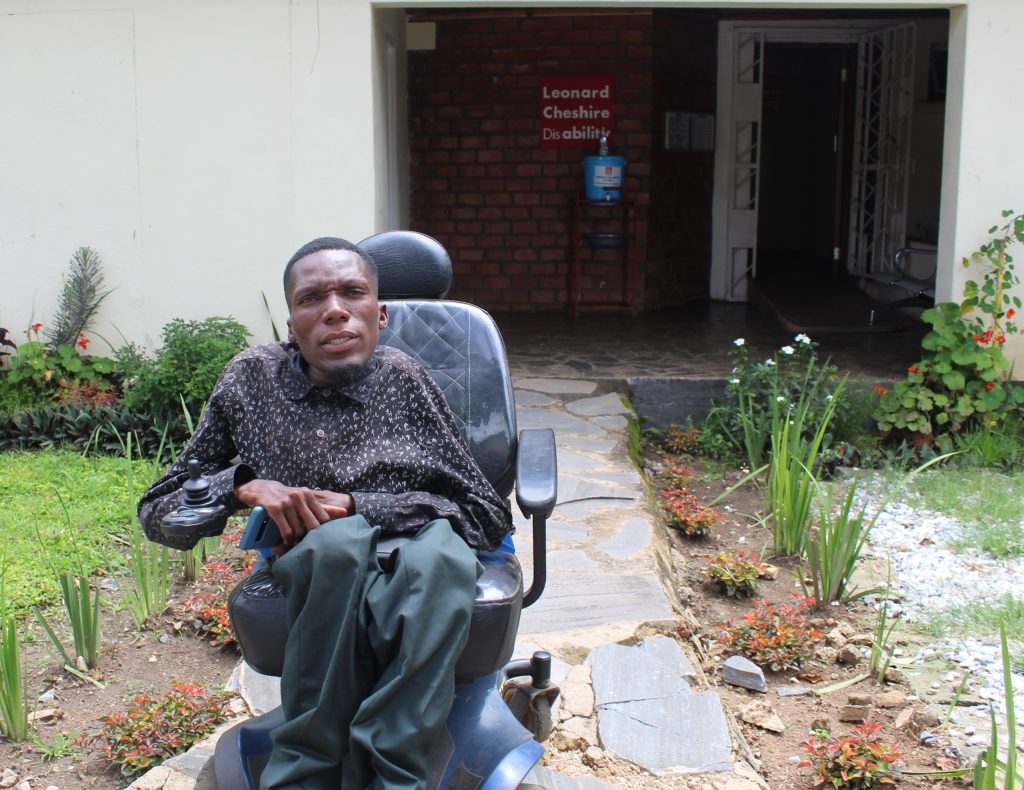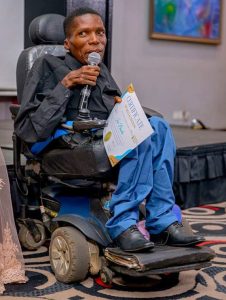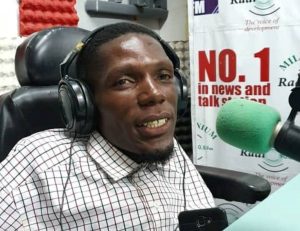Meet Ian: an inspirational youth leader from Zambia
 03 February 2023
03 February 2023

Ian (29) is the first born in a family with five children. Like his younger brother, he has Muscular Dystrophy and is therefore bound to a wheelchair. Ian is pursuing his diploma at the Zambia College of Pension and Insurance Trust, thanks to a scholarship from the Archie Hinchcliffe Disability Intervention (AHDI) under the CHSZ Child Empowerment Project that is funded by the Liliane Foundation.
So you study hard, do you have time for volunteer work?
Yes, already during high school I was an active member of the Youth Alive Club, and I founded the youth-led organization Youth in Action for Disability Inclusion in Zambia (YADIZ). I still volunteer at YADIZ and we promote inclusion of young people with disabilities in social, political, economic, and cultural spheres of life.
In 2017, I was selected to be part of the highly competitive Mandela Washington Fellowship Program and I took part in the University of Minnesota’s Public Management Program. I was trained in a wide range of domains, including policy, leadership and networking, and I strongly advocated for the rights of children and youths with disabilities. During that fellowship, I met and dined with different government officials in the US; this inspired me to do more on disability issues in the media.

A year later, in 2018, I went to London to train other youths with disabilities on how to write their stories in line with the Sustainable Development Goals 3, 4 and 8. And in the same year, I joined about 140 other young leaders from all over the SADC region for the Young African Leaders Initiative (YALI) on leadership skills. Despite having finished my education, having graduated for different studies and diploma’s, and despite with my broad knowledge and skills, I have never found a job; this is because of my disability and negative perceptions from employers who think that I cannot work.
“I have a disability, so I am the expert on disability issues.”
That seems very unfair. So how do you put your skills into practice in the Make Way program?
With my knowledge on disability rights issues, and after having served as the chairperson for the just ended Youth Advocacy Project (funded by the EU), I was invited to become a member of the regional council for young people with disabilities within the Make Way program. It is my goal to report on the situation of access to SRH services for youths with disabilities in Zambia, and to investigate to what extent the SRH rights of persons with disabilities are recognized in Zambia’s policy and legal frameworks.
Within the Make Way program, I want to share my experiences and offer solutions on how we can break barriers in accessing SRHR services and information for youths with disabilities. The regional council of youth with disabilities is important for me to take part in, as we are in different countries and we have different methods on how we deal with the challenges that youths with disabilities face; it is important to share and learn from each other.
So what are challenges that young people with disabilities face in your community?
Like for all youths, access to information and different social services such as health, education and employment opportunities are the biggest challenge. Negative perceptions and ignorance from community leaders are the main reason. Health, and in particular information on Sexual and Reproductive Health and Rights, is the biggest challenge, in particular for people with disabilities.
Discrimination is real; I still face discrimination in my community. I have a two-year old daughter and most of the time people say she is not my biological daughter and perhaps I was just cheated on by my wife. This is not true because I know myself that I am sexually active. But my community continues to think that that is not possible.
As a youth advocate, what do you want to achieve?
 I know now that Sexual and Reproductive Rights are Human Rights, and they apply to all people. I wish to build a strong national network of youths with disabilities defending their human rights. Young people with disabilities have to believe in themselves and work hard despite the challenges we go through in our daily lives.
I know now that Sexual and Reproductive Rights are Human Rights, and they apply to all people. I wish to build a strong national network of youths with disabilities defending their human rights. Young people with disabilities have to believe in themselves and work hard despite the challenges we go through in our daily lives.
My message to young people with disabilities in Zambia and beyond is to keep moving with one voice, and to promote inclusion for youths with disabilities in all spheres of life.
My dream is to run for presidency in the future; then I will create a paradigm shift in how we see persons with disabilities in Zambia.



